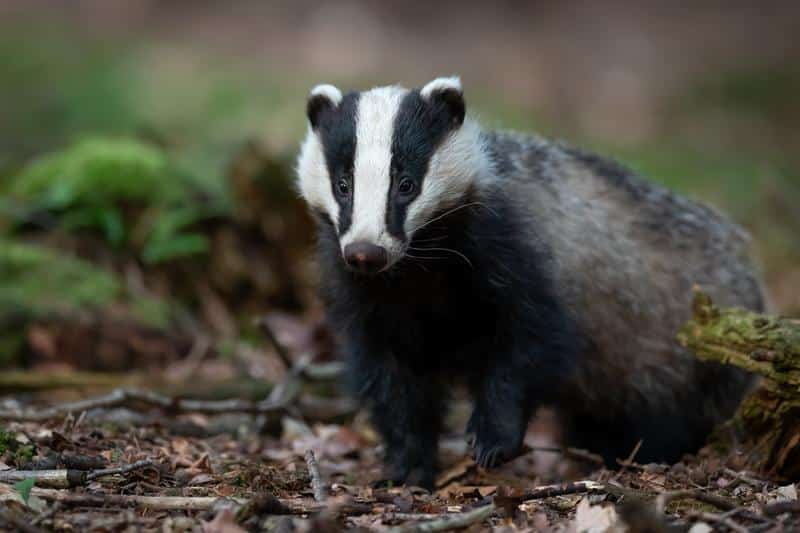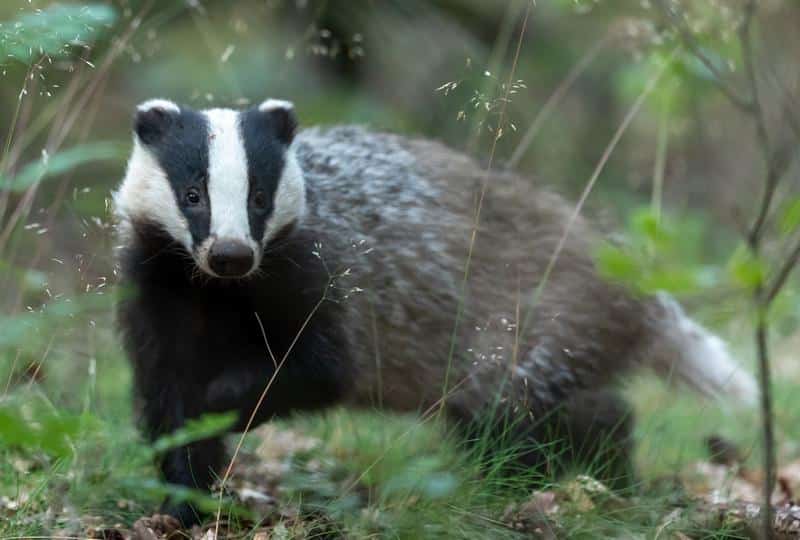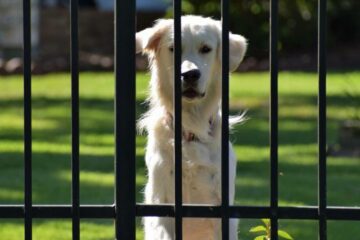Are Badgers Dangerous to Dogs? (+How to Stop Attacks!)
Are badgers dangerous to dogs? If you’re trying to figure out just how careful you need to be with your pup around these animals, this article is for you. In it, we’ll cover tough but important subjects like do badgers attack dogs and is badger poo dangerous to dogs. Next, we’ll help you to be sure your dog doesn’t provoke an attack by teaching you how to stop your dog barking at badgers. Keep reading for all this information and more!
Are Badgers Dangerous to Dogs?

Yes, badgers can be dangerous to dogs. If provoked or cornered, they can defend themselves fiercely, potentially causing serious harm to dogs. This is mainly due to their strong jaws, sharp claws, and robust bodies. However, most encounters between dogs and badgers do not result in conflict, especially if dogs are properly supervised and trained to behave around wildlife.
Why Badgers Can Be Dangerous to Dogs
Badgers are typically non-aggressive and prefer to avoid confrontations. However, if they feel threatened or are defending their young or territory, they can become extremely defensive and aggressive. Their large front claws are designed for digging but can also be used as formidable weapons, and their strong jaws can deliver powerful bites. These characteristics make them capable of inflicting severe injuries on dogs.
Typical Dog and Badger Interactions
Most interactions between dogs and badgers occur when dogs encounter badgers while out walking or if a badger enters a garden where a dog is present. If a dog spots a badger and gives chase, the badger might run away or, if cornered, turn to fight. Dogs, especially those with a high prey drive or hunting instincts, may chase or harass badgers, which can lead to conflict.
Preventing Dog-Badger Confrontations
To prevent confrontations, always keep your dog on a leash, especially during nighttime walks or in areas where badgers are known to live. Training your dog to follow commands like “leave it” or “come” can also help to manage their behavior around wildlife. Additionally, it’s a good idea to make your property less attractive to badgers by securing your trash and not leaving pet food outside.
These steps will get your dog to stay calm around badgers, but it’s important to remember that the underlying behavioral issues (prey drive, anxiety, overexcitement, etc.) that were causing all of this to begin with will still be present. And until you address those, any positive changes you see are only going to be temporary.
“Well, how do I make these changes last?”
By getting your dog to truly choose to follow your direction, that’s how. I tried many times to write out how you can do this before deciding it made more sense to just link you to the free video series that explains it better than I’d ever be able to.
The series is by a man named Dan who is one of the world’s leading dog obedience trainers. In it, he teaches you how to put an end to things like when your dog isn’t staying calm around badgers and all other misbehavior using his fast and easy-to-follow methods.
In the first video, Dan will reveal to you why the two most common methods of dog training only doom you to failure. You can watch the video now by clicking here. Follow the proven system he’ll show you in his series and you’ll never have to spend another second worrying about your dog not staying calm around badgers ever again!
Do Badgers Attack Dogs?

Badgers do attack dogs if they feel threatened or cornered, though it’s not common. Typically, badgers prefer to avoid conflict and will only fight as a last resort to defend themselves. However, when a fight does occur, a badger can potentially cause serious harm to a dog due to their sharp claws and strong jaws.
Will a Badger Attack a Dog?
Badgers are typically not aggressive creatures and tend to be more afraid of dogs than dogs are of them. They prefer to stay clear of any potential threats, including dogs. However, if a dog chases or corners a badger, the badger may feel compelled to defend itself, which could lead to an attack.
Under What Circumstances Do Badgers Attack Dogs?
Badgers are most likely to attack dogs under specific circumstances, such as when they are cornered or if they are defending their young or territory. A badger’s first instinct when confronted is often to flee. However, if escape is not an option, or if their offspring are threatened, they will fight back with considerable force.
Can a Badger Kill a Dog?
While rare, a severe attack from a badger could potentially kill a dog, especially a small one. Badgers have strong jaws that can deliver powerful bites and long claws meant for digging that can cause deep wounds. Therefore, it’s crucial for dog owners to supervise their pets, especially in areas known to be inhabited by badgers.
Preventing Badger Attacks
To prevent badger attacks, it’s important to keep dogs on a leash, particularly in areas where badgers are known to live. Training your dog to respond to commands like “leave it” or “come” can help manage their behavior around wildlife. Additionally, securing your garden or yard to deter badgers from entering can minimize the chances of an encounter.
While badgers do attack dogs, they generally prefer to avoid conflict. Most badger attacks occur when the badger is cornered or feels threatened. By keeping dogs under control and away from potential badger habitats, these encounters can be significantly minimized or even avoided. Learn more you should know in the first section.
It’s very important to get control of your dog’s behavior around badgers and other wild animals now so that you’ll be prepared for any critter you may encounter. This will ensure you can take your walks in peace without worrying about dealing with your dog and foxes, dog and raccoons, dog and skunks, dog and possums, dog and beavers, or dog and groundhogs ever again.
Is Badger Poo Dangerous to Dogs?
Yes, badger feces can potentially be harmful to dogs as they may carry parasites or bacteria that can cause diseases. If your dog comes into contact with badger feces, it’s crucial to prevent them from ingesting it and to clean them thoroughly.
- Parasites and Bacteria: Like feces from any wild animal, badger poo has the potential to be a carrier for various parasites and bacteria. These could include organisms such as giardia or leptospirosis. When dogs ingest these parasites or bacteria, it can lead to illness, with symptoms ranging from digestive issues to more severe health problems.
- Prevention is Key: The best course of action to protect your dog from the potential risks posed by badger feces is to prevent them from coming into contact with it in the first place. This can be a challenge, particularly if badgers are common in your area or frequent your property, but there are measures you can take. Teaching your dog a reliable recall command can be invaluable in these circumstances, allowing you to direct them away from any badger feces. Additionally, supervising your dog’s outdoor activities can help you intervene before any contact occurs.
- Immediate Cleaning: In the event that your dog does come into contact with badger feces, immediate cleaning is of utmost importance. Use a dog-friendly cleaning product to thoroughly clean the area of contact. If your dog has had extensive contact with the feces, a bath may be necessary to ensure the complete removal of any residual feces and potential pathogens.
- Veterinary Attention: If your dog has ingested badger feces, or if they’re exhibiting signs of illness following contact, don’t hesitate to seek veterinary attention. Signs of possible illness can include symptoms such as vomiting, diarrhea, lethargy, or loss of appetite. The sooner your pet receives veterinary care, the better their chances for a speedy and full recovery.
While badger feces are not inherently toxic, they can carry disease-causing organisms that can pose a health risk to dogs. As a result, prevention, prompt cleaning, and immediate veterinary attention when necessary are the best strategies for keeping your dog safe. Learn more important information in the first section.
How to Stop Dog Barking at Badgers
To stop your dog from barking at badgers, you need to address the root of the problem by managing their environment, providing proper training, and promoting positive reinforcement. Using commands like “quiet” can be a helpful tool. Keep your dog on a leash when in badger territory and work on training exercises to redirect their attention away from badgers.
The “Quiet” Command
Start by teaching your dog the “quiet” command. When your dog starts barking, calmly say “quiet” and reward them with a treat or praise when they stop barking. Consistent practice will help them understand that “quiet” means they need to stop barking.
Managing Your Dog’s Environment
Management plays a crucial role in addressing dog barking. If you know badgers frequent certain areas, avoid those when walking your dog, particularly at night when badgers are most active. Similarly, secure your garden or yard to discourage badgers from coming near your home.
Provide Mental and Physical Stimulation
Often, dogs bark due to pent-up energy. Ensuring your dog gets plenty of exercise and mental stimulation can help mitigate this issue. Interactive toys, puzzle feeders, regular walks, and playtime can help drain energy and reduce their desire to bark.
Positive Reinforcement Training
Using positive reinforcement methods can also be helpful. Whenever your dog sees a badger but doesn’t bark, reward them with a treat or praise. This can help them associate seeing badgers with positive experiences, reducing the likelihood of barking.
Address Underlying Issues
If your dog’s barking continues to be a problem, you likely have an underlying behavioral problem that is driving everything that you’ll need to address first. Learn how to do that by going back to the first section of this article.
I’m sure you’re ready to quit worrying about your dog attacking or being attacked by a badger, so I’ll let you get started now. Good luck with everything, and thanks for reading our article “Are Badgers Dangerous to Dogs? (+How to Stop Attacks!)”.





